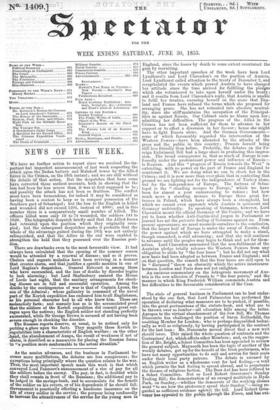NEWS OF THE WEEK.
- WE have no further action to report since we received the im- . portant but imperfect announcement of last week respecting the Attack ppon the Redan battery and Malakoff tower by the Allied force's in the Griinea, on the 18th instant; and we are still without the details of that action. But the despatches that have come haye corrected those earliest accounts, both in showing that the ' loss had been far less severe than it was at first supposed to be;
and possibly the attack has not been so fruitless. The conflict - .
must have been tremendous, for indeed it may be considered as having been a contest to keep or to conquer possession of the Southern part of Sebastopol; but the loss to the English in killed sea wounded did not exceed 1295, instead of 4000; and in this number there is a comparatively small number of killed. The officers killed were only 19 to 74 wounded, the soldiers 144 to ' 1058. The telegraphic despatch-briefly said that the Allied forces had retreated upon the position which they originally occu- pied; but the subsequent despatches make it probable that the whole of the advantage gained during the 18th was not entirely relinquished, and that the Allies in the end were enabled to .strengthen the hold that they possessed over the Russian posi- tion.
There are drawbacks even to the most favourable view. It had -always been calculated that the opening of the summer season would be attended by a renewal of disease ; and so it proves. Cholera and cognate maladies have been reviving in a manner that creates alarm, and that justifies a specific mention in one of lord Raglan's despatches. General Estcourt is among those who have succumbed, and the loss of deaths by disorder begins to look alarming ; but Lord Shaftesbury assured the House of Lords last night, that the sanitary arrangements for check- ing disease are in full and successful operation. Among the deaths by the contingencies of war is that of Captain Lyons, the son of the Admiral; whose gallantry in command of the naval part of the Kertch expedition has endeared him to all Englishmen, as his personal character had to all who knew him. These are melancholy facts; and seemly less so is the accumulated proof that the soldiers of the Kertch expedition did commit great out- rages upon the natives ; the English soldier not standing perfectly exonerated, while Sir George Brown is accused of not having been severe enough in checking the disorder. The Russian reports deserve, as usual, to be noticed only for putting a gloss upon the facts. They magnify these Kertch ix- :regularities into a characteristic of English warfare : on the other ...hand, the abandonment of Anapa, the result of weakness if not of slain', is described as a manceuvre for placing the Russian forces in "a position more conformable to the actual situation,"


































